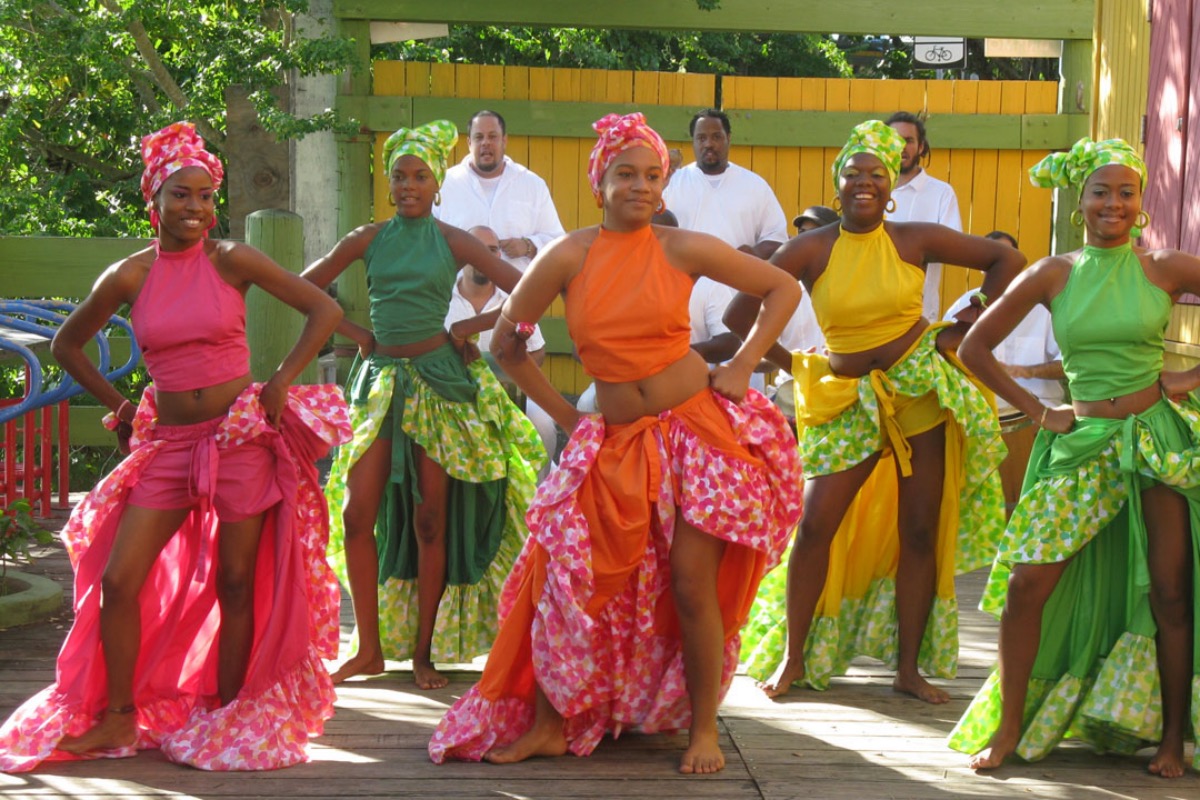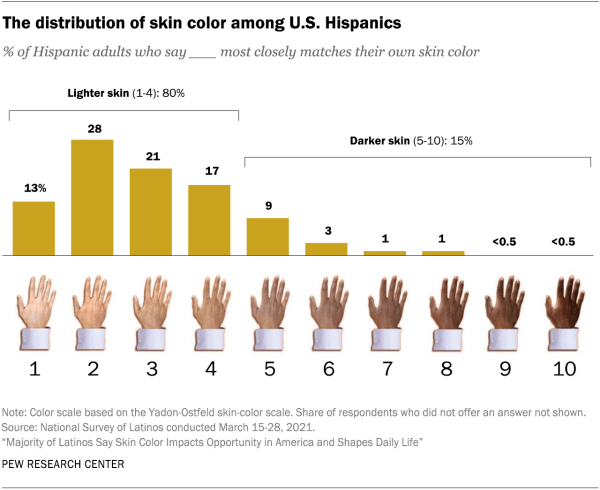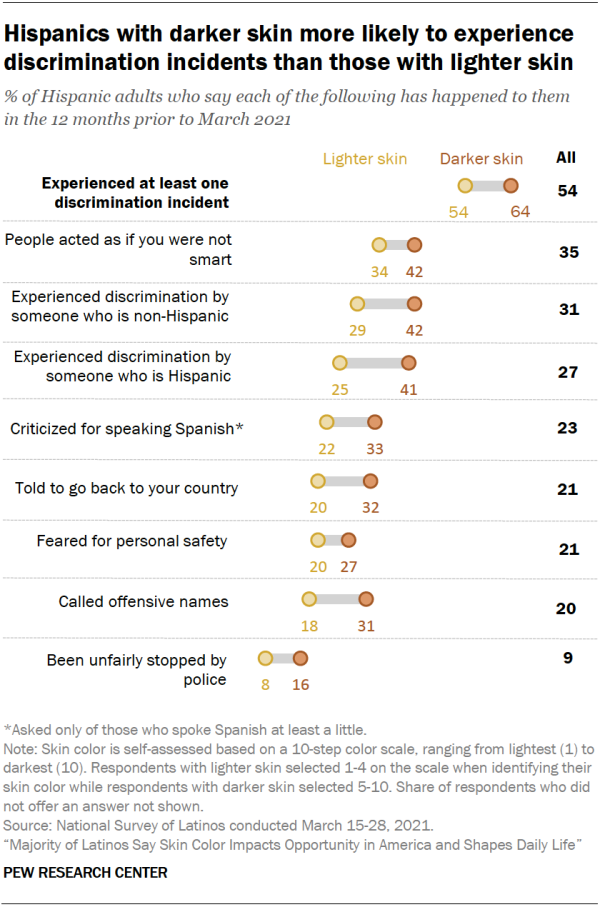Sixty-two percent of adult Latinos say having darker skin limits a Latino’s chances of success in the United States, according to the results of a new study conducted by Pew Research Center. Of the 3,3375 adult Latinos surveyed in March of 2021, 59 percent said having lighter skin improves a Latino’s chances of getting ahead.
A majority, 59 percent, said skin color plays a role in their daily lives, and half said discrimination based on race or skin color is a “very big problem” in the United States.
Colorism, or discrimination based on skin color, is such a widespread and well-known issue within Latino communities that I’m confident most readers understand the difference between colorism and racism. But Pew makes the distinction in a telling way, saying that “Hispanics in the U.S. may face discrimination because they are Hispanic (a form of racism), but the degree of discrimination may vary based on skin color, with those of darker shades experiencing more incidents (a form of colorism). And because of colorism’s deep roots in the histories of Latin America and the United States, discrimination based on skin color can occur among Hispanics just as much as it can be directed at Hispanics by non-Hispanics.”
Darker-skinned Latinos understand the difference between colorism and racism almost instinctively, especially Black Latinos, having experienced the two their entire lives.
Racism for a Latino is receiving no job offers due to the Spanish name at the top of his or her resume; colorism is the look on the interviewer’s face when they realize that the applicant is one of those Latinos. Racism for a Latino is being ignored by the Chads and Samanthas in the dating pool; colorism is being ignored by fair-skinned Franciscos and Marías, or the look on their parents’ faces when Francisco or María brings home un indio or moreno.
Racism is being treated differently based on what you are; colorism is being treated differently based on how you look. They’re related, of course, with racism being rooted in the notion that whatever is not characteristic of Northern European stock is inferior, including dark skin, curly hair, and thick lips —though a lot of those features are being appropriated lately by Anglos trying to keep up with the Kardashian sisters, who, as Armenian Americans, are literally Caucasian, but look more and more Latina by the day.
Pew showed the Latino respondents ten skin colors ranging from light to dark, on a scale of one to ten, and asked them to select the color that best resembled their own. Eighty percent chose a color between one and four, while only 15 percent chose a color between five and ten.
Pew listed eight incidents of discrimination —including as “People acted as if you were not smart,” “Experienced discrimination by someone who is Hispanic,” “Been unfairly stopped by police”— and asked Latino respondents to identify which ones, if any, they had experienced in the previous 12 months. Fifty-four percent of the adult Latinos asked said they experienced at least one of the eight incidents of discrimination, with darker-skinned Latino more likely to say they experienced at least one and lighter-skinned Latinos more likely to say they didn’t experience any.
“Among the discrimination experiences included in the survey, being treated as if they were not smart is the most reported,” says Pew. “Some 42% of Latinos with darker skin say this happened to them, as do 34% of Latinos with lighter skin.”
Latinos who said they experienced at least one of the forms of discrimination were more likely to say that having lighter skin helps Latinos get ahead in the United States.
Forty-one percent of darker-skinned Latinos said they experienced discrimination by someone who themselves is Latino, while only 25 percent of lighter-skinned Latinos said the same.
On the issue of racial justice overall, 37 percent of the adult Latinos asked said racial justice isn’t given enough attention, 36 percent said it is given too much attention, and 25 percent said racial justice issues received the right amount of attention.
Almost half of the Latinos surveyed said they have heard fellow Latinos make racist comments or jokes about other Latinos, while a slightly lesser number said the racist comments or jokes were directed at non-Latinos.
I want to make a note here about surveys. Surveys and polls are notoriously inaccurate, by no fault of the surveyors and pollsters themselves. But when I hear that 3,3375 Latinos were surveyed at random, I wonder who and where these Latinos are. I’ve never been surveyed for anything, I don’t know anyone who has, and I would think, given the circles I run in, I would’ve met someone somewhere who told me about being surveyed. That’s one reason that makes me doubt the results of such studies.
Second, it’s well known that people who are surveyed on controversial or at least uncomfortable issues tend to give better, more politically correct responses. People rarely admit to having negative feelings and beliefs even to themselves, much less to some random person taking a survey. And even a darker-skinned Latino may not be willing to admit just how much he or she is discriminated against because of his or her skin color, not wanting to play the victim or seem overly sensitive.
So if 62 percent of the adult Latinos surveyed by Pew said that having darker skin hurts a Latino’s ability to succeed in the United States, or 57 percent say that skin color affects their daily lives, you have to wonder if those numbers aren’t actually 10 points higher, at least.
However inaccurate it may be, the recent survey conducted by Pew, as with all its surveys, provides a decent snapshot of how U.S. Latinos think and feel about colorism.
***
Hector Luis Alamo is the Senior Editor at Latino Rebels and hosts the Latin[ish] podcast. Twitter: @HectorLuisAlamo






[…] the existence of disturbing racial disparities amongst Latinos. This is a problem because as the Pew Research Center and other researchers have long noted, there are distinct social outcomes based on labor market […]